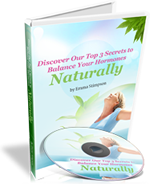Book a Consultation with Naturopath Emma Stimpson
Hot flushes getting you down?
Menopause marks the end of the reproductive years of a woman’s life. The timing of natural menopause is variable, usually occuring between 40 and 60 years of age, with an average age of 51 years. The transition into menopause, commonly lasts for two to three years. This time is marked by signs of change. You may experience irregular periods, skin changes, mood changes, depression, memory loss, insomnia, fatigue, low libido, vaginal dryness, night sweats or hot flushes. For some women these symptoms are very mild. Other women experience severe symptoms that can be debilitating. Natural medicines including herbal medicine along with simple dietary and lifestyle changes can balance your hormones and help you to feel normal again.
Menopause is confirmed when periods have stopped for over twelve months and blood tests consistently show elevated FSH levels and low estrogen levels. However, peri-menopause cannot de diagnosed or assessed with a blood test. The good news is there has been a recent development in hormone testing called salivary hormone testing. This test is non-invasive, simple and safe. The test is highly sensitive and can pick up even very slight hormonal imbalances that can cause aggravating symptoms but cannot be detected via blood testing.
As natural medicine practitioners, we are able to use the results of this testing to formulate effective and individualised Treatment Plans for our patients. The prescription and recommendations made in your Treatment Plan will relieve your menopausal symptoms and help you to achieve your health and wellbeing goals.
Herbal Medicine
A traditional herb that has been used for hundreds of years to relieve menopausal symptoms is Cimicifuga racemosa. The herb may relieve your night sweats, hot flushes, insomnia, headaches and irritability. Recent clinical trials have found the herb to be a safe and effective alternative to oestrogen replacement therapy during menopause.
Food as Medicine
The foods you eat can make a big difference to how you feel during menopause. Making small changes can have a big effect. It can help to:
1. Include foods in your diet that contain phyto-estrogens (eg tofu, soy milk, linseeds).
2. Eat more green vegetables, a rich source of phyto-nutrients and anti-oxidants.
3. Reduce your intake of caffeinated drinks including coffee and coke.
4. Drink at least two litres of water each day.


 At the age of 45 I started getting migraine headaches, stomach cramps, mood swings plus feelings of illness and sight issues prior to my periods. This had been happening for about six months before I consulted with naturopath Emma Stimpson....
At the age of 45 I started getting migraine headaches, stomach cramps, mood swings plus feelings of illness and sight issues prior to my periods. This had been happening for about six months before I consulted with naturopath Emma Stimpson....
Book Online
Phone: (03) 5986 5170
687 Point Nepean Rd, McCrae, Vic, 3938, AUS
(Located at Seaside Osteo)